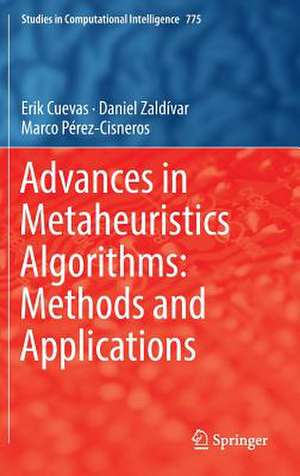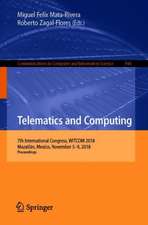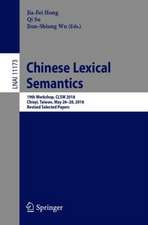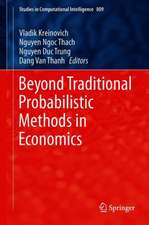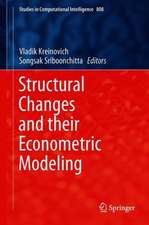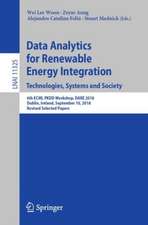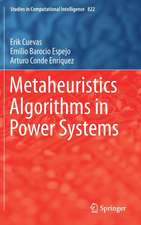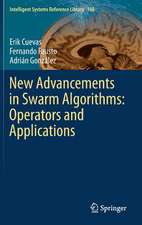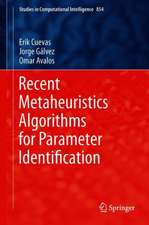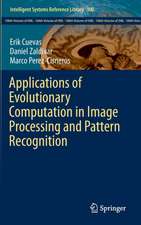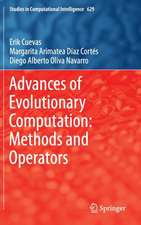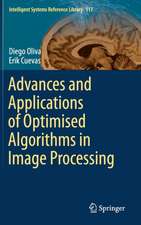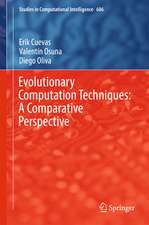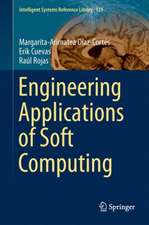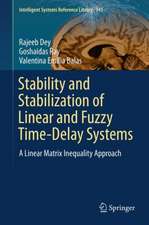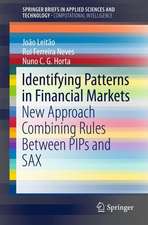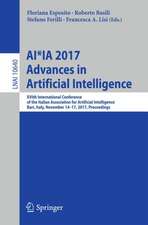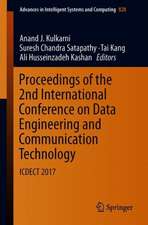Advances in Metaheuristics Algorithms: Methods and Applications: Studies in Computational Intelligence, cartea 775
Autor Erik Cuevas, Daniel Zaldívar, Marco Pérez-Cisnerosen Limba Engleză Hardback – 20 apr 2018
This book explores new alternative metaheuristic developments that have proved to be effective in their application to several complex problems. Though most of the new metaheuristic algorithms considered offer promising results, they are nevertheless still in their infancy. To grow and attain their full potential, new metaheuristic methods must be applied in a great variety of problems and contexts, so that they not only perform well in their reported sets of optimization problems, but also in new complex formulations. The only way to accomplish this is to disseminate these methods in various technical areas as optimization tools. In general, once a scientist, engineer or practitioner recognizes a problem as a particular instance of a more generic class, he/she can select one of several metaheuristic algorithms that guarantee an expected optimization performance. Unfortunately, the set of options are concentrated on algorithms whose popularity and high proliferation outstrip thoseof the new developments. This structure is important, because the authors recognize this methodology as the best way to help researchers, lecturers, engineers and practitioners solve their own optimization problems.
| Toate formatele și edițiile | Preț | Express |
|---|---|---|
| Paperback (1) | 588.66 lei 38-44 zile | |
| Springer International Publishing – 14 dec 2018 | 588.66 lei 38-44 zile | |
| Hardback (1) | 648.59 lei 6-8 săpt. | |
| Springer International Publishing – 20 apr 2018 | 648.59 lei 6-8 săpt. |
Din seria Studies in Computational Intelligence
- 20%
 Preț: 449.37 lei
Preț: 449.37 lei - 20%
 Preț: 1158.26 lei
Preț: 1158.26 lei - 20%
 Preț: 986.66 lei
Preț: 986.66 lei - 20%
 Preț: 1452.76 lei
Preț: 1452.76 lei - 20%
 Preț: 168.78 lei
Preț: 168.78 lei - 18%
 Preț: 1112.30 lei
Preț: 1112.30 lei - 20%
 Preț: 565.38 lei
Preț: 565.38 lei - 20%
 Preț: 649.28 lei
Preț: 649.28 lei - 20%
 Preț: 1047.73 lei
Preț: 1047.73 lei - 20%
 Preț: 1578.96 lei
Preț: 1578.96 lei - 20%
 Preț: 643.50 lei
Preț: 643.50 lei - 20%
 Preț: 657.49 lei
Preț: 657.49 lei - 20%
 Preț: 993.28 lei
Preț: 993.28 lei - 20%
 Preț: 990.80 lei
Preț: 990.80 lei - 20%
 Preț: 989.96 lei
Preț: 989.96 lei - 20%
 Preț: 1165.69 lei
Preț: 1165.69 lei - 20%
 Preț: 1444.52 lei
Preț: 1444.52 lei - 20%
 Preț: 1041.96 lei
Preț: 1041.96 lei - 20%
 Preț: 1047.73 lei
Preț: 1047.73 lei - 20%
 Preț: 1046.06 lei
Preț: 1046.06 lei - 18%
 Preț: 2500.50 lei
Preț: 2500.50 lei - 20%
 Preț: 989.13 lei
Preț: 989.13 lei - 20%
 Preț: 1165.69 lei
Preț: 1165.69 lei - 20%
 Preț: 1164.05 lei
Preț: 1164.05 lei - 20%
 Preț: 1042.79 lei
Preț: 1042.79 lei - 20%
 Preț: 1460.19 lei
Preț: 1460.19 lei - 18%
 Preț: 1403.52 lei
Preț: 1403.52 lei - 18%
 Preț: 1124.92 lei
Preț: 1124.92 lei - 20%
 Preț: 1039.47 lei
Preț: 1039.47 lei - 20%
 Preț: 1008.11 lei
Preț: 1008.11 lei - 20%
 Preț: 1045.25 lei
Preț: 1045.25 lei - 20%
 Preț: 1275.42 lei
Preț: 1275.42 lei - 20%
 Preț: 1040.32 lei
Preț: 1040.32 lei - 20%
 Preț: 988.32 lei
Preț: 988.32 lei - 20%
 Preț: 1169.79 lei
Preț: 1169.79 lei - 20%
 Preț: 1162.37 lei
Preț: 1162.37 lei - 20%
 Preț: 1059.26 lei
Preț: 1059.26 lei - 20%
 Preț: 1164.05 lei
Preț: 1164.05 lei - 20%
 Preț: 1166.52 lei
Preț: 1166.52 lei - 20%
 Preț: 1459.38 lei
Preț: 1459.38 lei - 18%
 Preț: 1005.74 lei
Preț: 1005.74 lei - 20%
 Preț: 997.38 lei
Preț: 997.38 lei - 20%
 Preț: 1055.94 lei
Preț: 1055.94 lei - 20%
 Preț: 1284.47 lei
Preț: 1284.47 lei - 20%
 Preț: 994.08 lei
Preț: 994.08 lei - 20%
 Preț: 1048.72 lei
Preț: 1048.72 lei - 20%
 Preț: 1066.02 lei
Preț: 1066.02 lei - 20%
 Preț: 943.78 lei
Preț: 943.78 lei - 20%
 Preț: 1173.10 lei
Preț: 1173.10 lei - 20%
 Preț: 1457.72 lei
Preț: 1457.72 lei
Preț: 648.59 lei
Preț vechi: 810.74 lei
-20% Nou
Puncte Express: 973
Preț estimativ în valută:
124.10€ • 129.93$ • 102.69£
124.10€ • 129.93$ • 102.69£
Carte tipărită la comandă
Livrare economică 05-19 aprilie
Preluare comenzi: 021 569.72.76
Specificații
ISBN-13: 9783319893082
ISBN-10: 3319893084
Pagini: 243
Ilustrații: XIV, 218 p. 48 illus., 13 illus. in color.
Dimensiuni: 155 x 235 mm
Greutate: 0.5 kg
Ediția:1st ed. 2018
Editura: Springer International Publishing
Colecția Springer
Seria Studies in Computational Intelligence
Locul publicării:Cham, Switzerland
ISBN-10: 3319893084
Pagini: 243
Ilustrații: XIV, 218 p. 48 illus., 13 illus. in color.
Dimensiuni: 155 x 235 mm
Greutate: 0.5 kg
Ediția:1st ed. 2018
Editura: Springer International Publishing
Colecția Springer
Seria Studies in Computational Intelligence
Locul publicării:Cham, Switzerland
Cuprins
Introduction.- The metaheuristic algorithm of the social-spider.- Calibration of Fractional Fuzzy Controllers by using the Social-spider method.- The metaheuristic algorithm of the Locust-search.- Identification of fractional chaotic systems by using the Locust Search Algorithm.- The States of Matter Search (SMS).- Multimodal States of Matter search.- Metaheuristic algorithms based on Fuzzy Logic.
Textul de pe ultima copertă
This book explores new alternative metaheuristic developments that have proved to be effective in their application to several complex problems. Though most of the new metaheuristic algorithms considered offer promising results, they are nevertheless still in their infancy. To grow and attain their full potential, new metaheuristic methods must be applied in a great variety of problems and contexts, so that they not only perform well in their reported sets of optimization problems, but also in new complex formulations. The only way to accomplish this is to disseminate these methods in various technical areas as optimization tools. In general, once a scientist, engineer or practitioner recognizes a problem as a particular instance of a more generic class, he/she can select one of several metaheuristic algorithms that guarantee an expected optimization performance. Unfortunately, the set of options are concentrated on algorithms whose popularity and high proliferation outstrip those of the new developments. This structure is important, because the authors recognize this methodology as the best way to help researchers, lecturers, engineers and practitioners solve their own optimization problems.
Caracteristici
Discusses new alternative metaheuristic developments that have proven to be effective in their application to several complex problems Helps researchers, lecturers, engineers, and practitioners solve their own optimization problems Is well-structured so that each chapter can be read independently from the others
